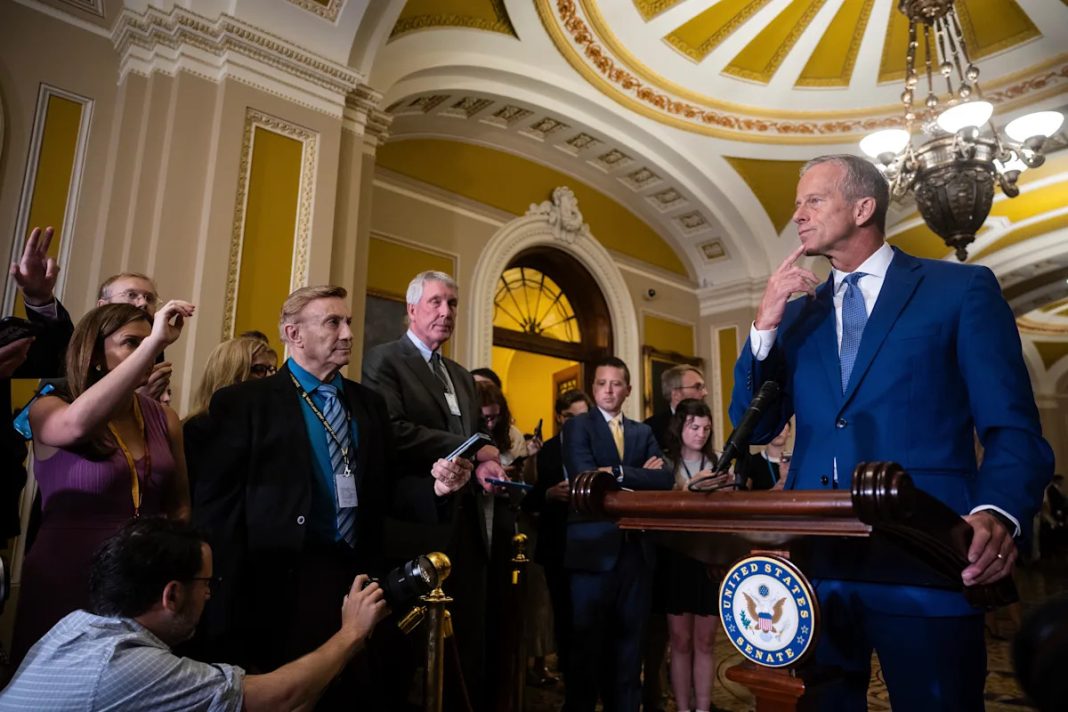The Senate is one step closer to approving a request from President Donald Trump to cancel roughly $9 billion in foreign aid and public media funding.
Senators narrowly voted 51-50 on two procedural hurdles the package needed to overcome. GOP Sens. Mitch McConnell of Kentucky, Lisa Murkowski of Alaska and Susan Collins of Maine voted against the moves Tuesday night, forcing Republicans to lean on Vice President JD Vance to break a two consecutive 50-50 ties to clear the initial roadblocks.
Even though Senate Republicans were able to start debate on the bill and leadership is feeling increasingly confident, a handful of GOP senators have yet to say if they will vote to pass it in the coming days, leaving the final outcome in flux. The chief complaint of Republican senators is that the White House refuses to give an account-by-account rundown of what funding would be nixed once Congress clears the package.
“OMB is the problem. They won’t tell us how they’re going to apply the cut,” McConnell said in a brief interview Tuesday night. “I want to make it clear I don’t have any problem with reducing spending. … They would like a blank check is what they would like, and I don’t think that’s appropriate.”
Congress has until Friday to get the bill to Trump’s desk, and the House is expected to need to vote a second time to greenlight changes. If Republicans don’t meet the midnight deadline on Friday, the White House must spend the funds they are trying to cancel.
“I don’t know. I think that there are members that are trying to get assurances on specific programs,” said Sen. Thom Tillis (R-N.C.), asked if he thought the package had the votes to pass.
Some GOP senators plan to vote for the package based on verbal assurances from the White House. But if Trump administration officials “betray the trust” by going back on those commitments, Tillis warned, “it may be the first and only rescissions package that they get and they should weigh that.”
Senate GOP leadership and the White House have been locked in a sprint of eleventh-hour negotiations to firm up the votes. As part of those discussions, they are expected to strip out of the package a proposed $400 million cut to global AIDS-prevention funding, known as PEPFAR, bringing the total amount of clawbacks from $9.4 billion to $9 billion.
“There was a lot of interest among members on doing something on the PEPFAR issue,” Thune said. “We hope that if we can get this across the finish line in the Senate, the House would accept that one small modification.”
In addition to removing the PEPFAR funding, Republicans are expected to include new language to “protect” programs related to maternal health, malaria, tuberculosis and nutrition. The substitute amendment containing this language is being spearheaded by Sen. Eric Schmitt (R-Mo.), who is leading the recissions effort in the Senate, and it will also explicitly state that food aid will not be touched as part of the package.
The two provisions will not change the new $9 billion topline that has been agreed to, said a person granted anonymity to disclose private negotiations.
White House budget director Russ Vought also offered reassurances to Sen. Mike Rounds (R-S.D.) that the administration would move funding around internally to help boost rural public stations that might otherwise be adversely affected by the funding cuts to PBS and NPR.
Still, Thune can only afford to lose three GOP senators and still have Vance break a tie to deliver a successful outcome later this week — and Republicans expect they will lose at least three colleagues on the final vote.
McConnell was not committal on how he’d vote on final passage.
Senate Appropriations Chair Susan Collins (R-Maine) vocally criticized the package during a GOP’s weekly closed-door lunch on Tuesday, leaving senators skeptical she will ultimately be able to get to “yes.”
Collins after the lunch called the commitment to protect PEPFAR “progress” and said that she was “looking at” the changes Schmitt put forward. But she has not said if the changes will be enough to win her support.
She is also still unsatisfied with the level of specificity the administration is willing to provide lawmakers on specific accounts and dollar amounts. She brought a visual aid to show reporters: the Clinton administration’s 1992 rescissions request with more details.
Underscoring how widely that frustration is held within the conference, Sen. Roger Wicker (R-Miss.) said shortly before the vote on Tuesday night that he would vote yes, but that GOP senators told the administration in conversations earlier in the day “next time give us the specific information.”
Democrats have been warning for weeks that the White House is not offering specifics because the administration intends to cut funding lawmakers from both parties support.
“They have been asked by Republicans for the specifics, and now they are saying they’re out of time,” Sen. Brian Schatz (D-Hawaii) said in a brief interview Tuesday afternoon, of administration officials.
“Hope springs eternal that they’re going to realize how damaging this is to their branch of government,” Schatz said about his Republican counterparts. “Why run for office and then outsource all the decisions to someone who was never elected, and won’t even tell you what he’s doing?”
Meanwhile, across the Capitol, some conservative House Republicans are warning that the Senate’s proposed changes could endanger the entire package.
“If they’re watering down too much, I’m not sure it moves,” said Texas Republican Rep. Chip Roy. “But if you get any of the rescissions that survive, they are still rescissions. But we’ll see what the Senate does.”
Jennifer Scholtes, Calen Razor and Nicholas Wu contributed to this report.

